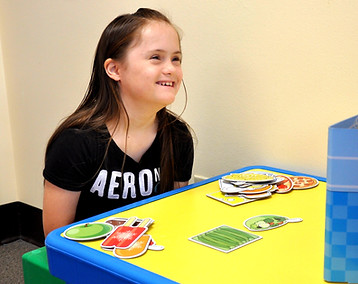
Cornerstone
Therapy Services
SPEECH-LANGUAGE PATHOLOGY
Effective communication is fundamental to all aspects of human functioning. The development of communication skills begins in infancy, before the emergence of the first words. Any delay or disability that influences a young child's early communication development is likely to have a significant effect on that child's personal, social, academic and vocational life (ASHA, 1989).
F
E
D
C
B
G
H
I
J

A
Evaluation: The basis of Therapy
The evaluation of your child is the first step of therapy. Evaluation includes careful observation and measurement of your child's speech and language abilities. From these observations and measurements, the clinician develops a treatment plan to meet your child's special needs. Measurement does not end here; however, throughout therapy, the clinician will measure your child's progress to set new goals for learning. Precise evaluation is an important part of therapy.
Therapy as a
Process:
Speech and language therapy involves a series of activities to meet specific goals. These goals are usually accomplished over time. Only rarely can a child's communication skills be changed in one or two sessions.
The length of therapy cannot really be predicted. But usually the more serious the disorder, the longer the period of therapy. You may see immediate improvement, or a period of gradual/steady progress. Sudden spurts of growth may occur throughout therapy. The rate and pattern of improvement is different for every child. Keep this in mind when your child starts speech-language therapy.
_edited.jpg)
Speech and Language Therapy Proceeds in Small Steps
Therapy is based on a carefully designed sequence of practice. The clinician selects key communication skills that are taught in several ways-- drill and practice, play interactions, or conversations.
The difficulty of the response required from your child is gradually increased over time. Thus, your child may be asked to practice using single words before using phrases and sentences. The clinician is careful to reinforce desired responses. Your child is clearly told which responses are correct and which are not correct. This is called feedback and it helps your child in the learning process. The therapy is programmed in small steps so that your child achieves much success, especially early in therapy. Gradually, your child is challenged to improve or expand speech and language skills.
The clinician will try to develop a good interpersonal relationship with your child. Your child will learn best in a warm and supportive environment. The clinician also uses games, and play activities to maintain your child's interest and stimulate the child to learn.
Frequency and Length of Therapy Sessions:
How often your child attends therapy depends on the child's age, the nature and severity of the communication disorder, and practical considerations of the cost and availability of services. Most commonly, children are seen for two to three sessions per week. For childhood apraxia of speech motor planning problem, daily treatment is often most successful.
Parents Play a Key Role in the Therapy Process:
You will probably be asked to help, by observing your child outside of therapy and helping your child practice at home. Sometimes you will need to learn how to respond to your child's communication difficulties. You will learn how to model certain speech and language forms as an example for your child. The clinician will prepare you for these activities by providing information, general counsel, or specific skill training. You can also help by assuring your child's steady attendance at therapy sessions. Most important, you can model for your child a positive attitude about the therapy process. To learn more about how you can help more, click here.

Clinician Qualifications:
The minimum qualifications of a speech-language pathologist are a Master's Degree plus national certification from the American Speech-Language-Hearing Association. This certification is signified by the letters C.C.C., which stands for Certificate of Clinical Competence. The State of Florida via the Department of Health/Division of Medical Quality Assurance requires a professional license to practice speech/language pathology. You should be comfortable in asking a clinician whether he or she has these credentials. One exception to this rule would be in university clinics, where graduate students carry out treatment. In this instance, you would want to be sure that students are supervised by instructors with an M.S., or M.A. degree and a C. C. C. certification. In addition to these minimum qualifications, you should only seek and stay with those clinicians who have scientific knowledge plus a caring approach to the therapy process.




